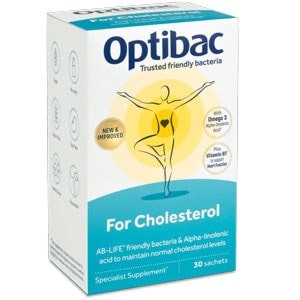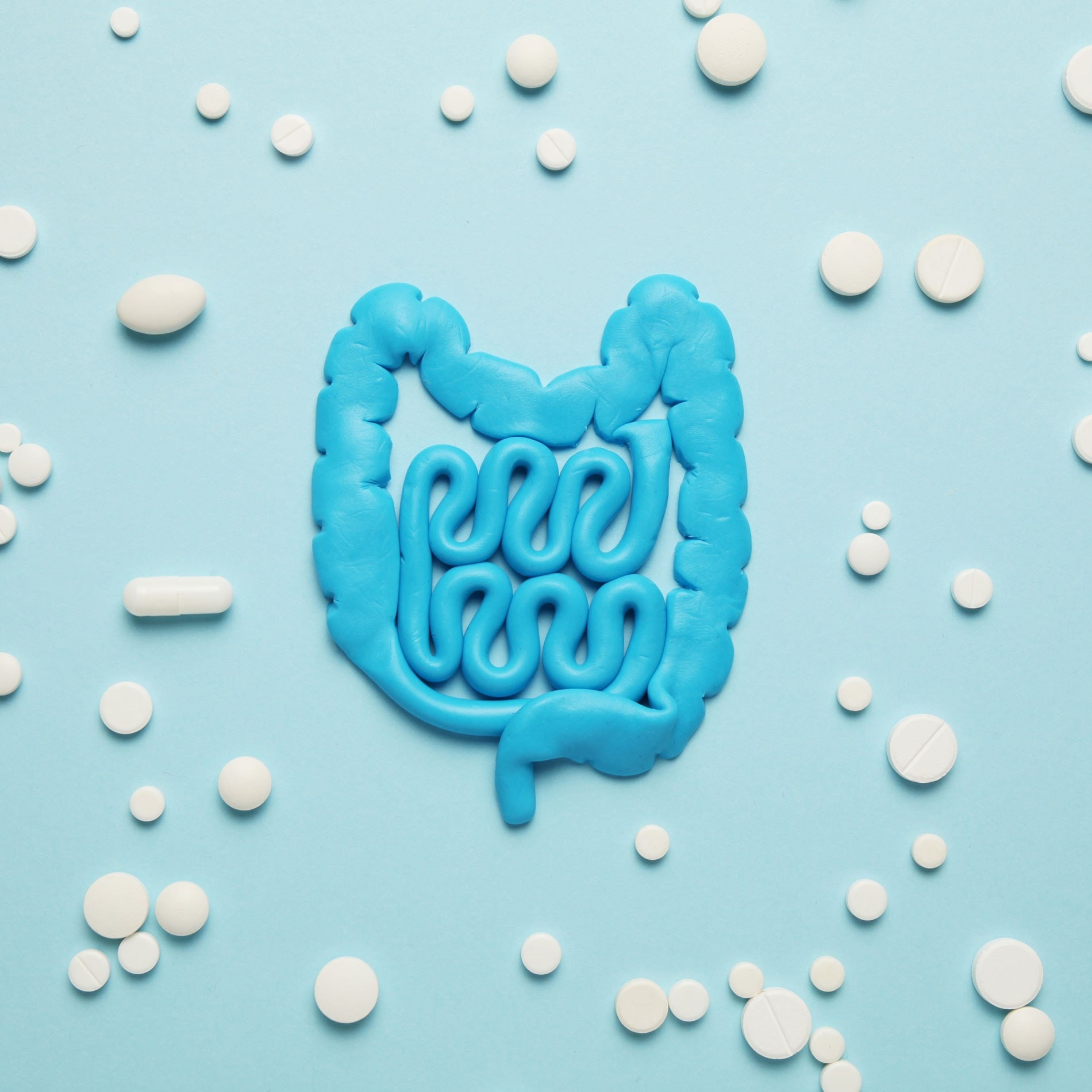You're away from FREE US delivery Free US delivery (applied at checkout) on orders over $60.00
You have qualified for Free US delivery
Lifestyle
Five Holistic Heart Health Tips
Every February is Heart Health Awareness month in the USA and across the world. Whatever the time of year it's always a good time to be thinking about keeping our hearts beating happily, but what does it take to make a healthy - and happy - heart?

Well, we’ve probably all heard that heart health is associated with other health conditions: high cholesterol, high blood pressure, diabetes and kidney disease to name a few of the more major connections. So there is a definite physiological aspect to consider when supporting heart health, but is there another angle?
Hmmm…maybe so – as my nickname at Optibac Probiotics is ‘Kooky Kerry’, you can always rely on me to think outside of the box! So I thought it was time to be a bit more ‘touchy-feely’ about this subject… to open our hearts and minds to some other, less conventional viewpoints…
Follow your heart…
We know that the heart is the most written-about organ in the body due to its association with love and romance, and the heart area is where we appear to feel all of the emotions related to happiness. It’s also where we experience the feeling of sadness, and there’s nothing more painful than an apparently ‘broken heart’. But did you know that some scientists actually recognise ‘broken heart syndrome’, or stress cardiomyopathy, as a cause of cardiac issues that can result in death1?
As the great Leonardo da Vinci once said: "Tears come from the heart and not the brain". Had this wise man realised that there was more to the heart than merely blood and tissue?
So what exactly is the deal with this enigmatic organ? Is the heart just a biological pump that is present merely to propel the blood around our body, or is it a highly-sophisticated organ that may even possess the ability to ‘think’ for itself?
The heart-brain link
We've all heard about the 'Gut-brain' connection - you can read more about that in our recent blog 'Couple of the Year: The Gut and the Brain'. But cutting edge fringe science also suggests a very strong heart-brain link, with the heart being in a constant two-way dialogue with the brain, and what is most exciting of all is that research suggests that the heart may send more signals to the brain than the other way around1!
What an amazing thought! And did I think it with my heart or my brain?
The Director of Research at the ‘Heart Math Institute’, Dr. Rollin McCraty, has focused the latter part of his career on exploring the effects of our emotions on heart–brain interactions and the subsequent effects on autonomic, cardiovascular, hormonal, and immune system function. Certainly some of his latest research into neurocardiology2 has firmly established that the heart has a highly sophisticated intrinsic nervous system that he and other scientists believe qualifies the heart to be considered a ‘brain’ in itself, and that it is able to process information and react accordingly.
Dr. McCraty also believes that our HRV – heart rate variability – is a key indicator of good health, and that our HRV is directly affected by our emotions, and this is a viewpoint that’s becoming validated by other recent studies3,4.
So how can we keep a happy heart?
I like to look at everyone – and every health issue – holistically, and believe that we should look at supporting our health through an all-round approach that encompasses diet, lifestyle and mindful living, with some natural supplements and/or medications where necessary. So I’ve put together five tips for a holistic heart health approach, based on some old-school, tried, tested and scientifically-proven diet and lifestyle tips, with a few more ‘touchy-feely’ things to think about too…
Five tips for a ‘whole-hearted’, holistic approach to heart health
1. Diet

From a dietary perspective, research shows that, again, it’s a combination of the right foods in a ‘whole diet’ approach, rather than just the inclusion of a couple of heart-friendly ‘superfoods’. A couple of recent studies5,6 suggest that the much-lauded Mediterranean Diet is a good dietary framework to follow: more vegetables, nuts, healthy oils from sources such as olive, nuts, avocado, and oily fish, and a small amount of lean meat. Also think about HOW you eat: enjoy those healthy meals in a leisurely fashion with family and friends, with maybe a little glass of red wine in moderation.
2. Get moving!
Most people appreciate that we need to exercise our muscles to keep them toned; well, the heart is a muscle too, and research shows a positive link between regular exercise and fitness and improved cardiovascular health7. Exercise can make us feel good too, and improve our overall health and sense of well-being. Don’t think that you need to become an athlete – regular moderate activity can be just as beneficial – just do anything to can to keep active within your own limitations, and gradually build up your exercise regime.
3. The gut-brain-heart connection!
You knew we couldn’t go for long without mentioning gut health! We always say that ‘good health starts in the gut’, but how can this apply to heart health too, I hear you ask? Amazingly, research suggests that certain strains of bacteria, via a combination of active mechanisms, can work to lower serum cholesterol. Lactobacillus plantarum CECT 7527, Lactobacillus plantarum CECT 7528, Lactobacillus plantarum CECT 7529 are the first probiotic strains available in the UK to have been shown in a clinical trial8 to help lower cholesterol – healthcare practitioners may be interested to know that you can find these strains in our For Cholesterol product along with high-quality alpha-linolenic acid (ALA) sourced from chia seeds and added vitamin B1 to support the maintenance of normal cholesterol levels.

4. Well-chosen supplements.
There are a bewildering array of supplements associated with improved heart health, and it can be difficult to know which one is best for you, so I’d always suggest seeking advice from a healthcare practitioner rather than taking a random cocktail of supplements and hoping for the best. But I’d like to highlight a couple of key supplements that may provide some benefits for cardiovascular health:
We’ve already mentioned healthy fats in our diet, but for some it can be a challenge to ensure that dietary sources provide enough for our needs. Alpha-linolenic acid has been positively associated with cardiovascular health and balanced cholesterol levels9, and so again, practitioners will be delighted to know that our easy to use, one-a-day powder sachet of ‘For Cholesterol’ includes vitamin B1 and ALA, making it an all-round supplement to help support a hard-working heart.
But one of my favourite supplements to help support cardiovascular health is magnesium: it’s a mineral that is becoming elusive in the modern diet, and deficiency has been linked to cardiovascular issues10. Because there are a few potential interactions and contraindications with magnesium, I would not advise everyone to self-prescribe this mineral supplement, but it’s certainly one to discuss with your doctor or healthcare practitioner.
5. And finally…lifestyle – we’re back to the ‘touchy-feely’ bit again!

Make sure that you are kind to yourself, your body and your heart by keeping stress levels to a minimum, practising mindful, conscious living and considering if your emotions could be affecting your heart health. In fact this is not just fuzzy nonsense – the British Heart Foundation devotes a whole booklet to the effect of your emotions on your heart health11 and vice versa, and studies show a link between depression and heart conditions such as myocardial infarction12.
So it seems that our emotions really do affect our hearts, and despite Oscar Wilde claiming that "The heart was made to be broken", I think we should make every effort to protect our hearts from undue emotional stress. Some people find meditation a great tool, but if this doesn't appeal then just do things that make you feel good. The simplest things are often the healthiest and the best: a walk in the country, a cuddle with a pet (or someone special!), your favourite hobby or a good book.
If nothing else, I hope that these few words have encouraged you to think about the connections between your body, your mind and the the internal organs within us that do such an amazing job of keeping us alive. We need to nurture ourselves and our bodies and realise what amazing beings we are!
For more about heart health, read these other recent articles from our News and Blog section:
Mildly high cholesterol levels in midlife can dramatically increase later risk
References:
1. M. J. A. P. Daemen (2013), The heart and the brain: an intimate and underestimated relation, Netherlands Heart J. 2013 Feb; 21(2): 53–54. Published online 2013 Jan 3. doi: 10.1007/s12471-012-0371-x PMCID: PMC3547419
2. McCraty, R., et al., “The effects of emotions on short-term power spectrum analysis of heart rate variability.” American Journal of Cardiology, 1995. 76(14): p. 1089–1093.
3. Quintana DS et al, (2012), Heart rate variability is associated with emotion recognition: direct evidence for a relationship between the autonomic nervous system and social cognition, Int J Psychophysiol. 2012 Nov;86(2):168-72. doi: 10.1016/j.ijpsycho.2012.08.012. Epub 2012 Aug 30.
4. Williams DP, et al (2015), Resting heart rate variability predicts self-reported difficulties in emotion regulation: a focus on different facets of emotion regulation, Front Psychol. 2015 Mar 10;6:261. doi: 10.3389/fpsyg.2015.00261. eCollection 2015.
5. Ramón Estruch, M.D., Ph.D., et al, (2013), Primary Prevention of Cardiovascular Disease with a Mediterranean Diet, N Engl J Med 2013; 368:1279-1290 April 4, 2013DOI: 10.1056/NEJMoa1200303
6. Gaetano, G. (2016), “Higher adherence to Mediterranean diet is associated with lower risk of overall mortality in subjects with cardiovascular disease: prospective results from the MOLI-SANI study”, paper presented to the European Society of Cardiology (ESC), Rome, Italy, 27 - 31 August 2016
7. Myers, J. (2003), Exercise and Cardiovascular Health, Circulation, 2003;107:e2-e5, published online before print January 7, 2003
8. Fuentes MC et al. (2006) Cholesterol lowering efficacy of Lactobacillus plantarum CECT 7527, 7528 and 7529 in hypercholesterolaemic adults. British Journal of Nutrition; pp 1 - 7.
9. Djoussé L et al. (2005) Dietary linolenic acid is inversely associated with calcified atherosclerotic plaque in the coronary arteries: the National Heart, Lung, and Blood Institute Family Heart Study. American Heart Association; 111: 2921-2926.
10. Del Gobbo et al (2013), Circulating and dietary magnesium and risk of cardiovascular disease: a systematic review and meta-analysis of prospective studies, Am J Clin Nutr. 2013 Jul;98(1):160-73. doi: 10.3945/ajcn.112.053132. Epub 2013 May 29.
11. British Heart Foundation, (2014), 'Heart to Heart: Heart Disease and your Emotional Health', Available online at: https://www.bhf.org.uk/-/media/files/publications/...heart.../g954_heart_to_heart.pdf [Accessed: 28/9/16]
11. Connerney, I DRPH,& Shapiro, P.A., M.D. (2013), Assessment of Depression in Heart Failure Patients: What Is the Role for Cardiology?, Journal of the American College of Cardiology, Vol. 57, No. 4, 2011
Popular Articles
View all blogs-
Lifestyle27 Apr 2021
-
About Probiotics04 May 2023
-
Health News16 Mar 2023


